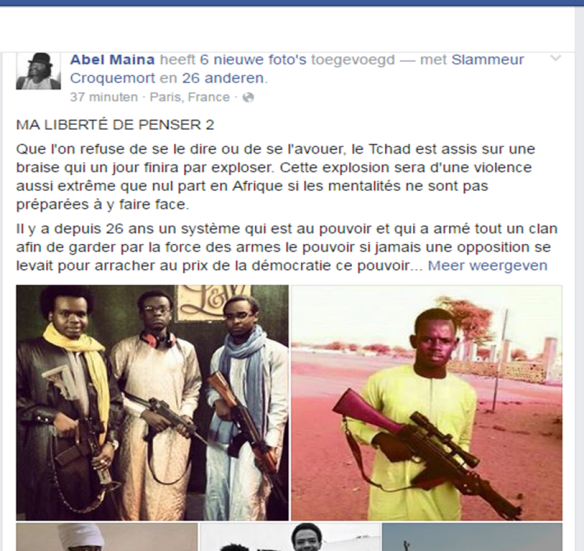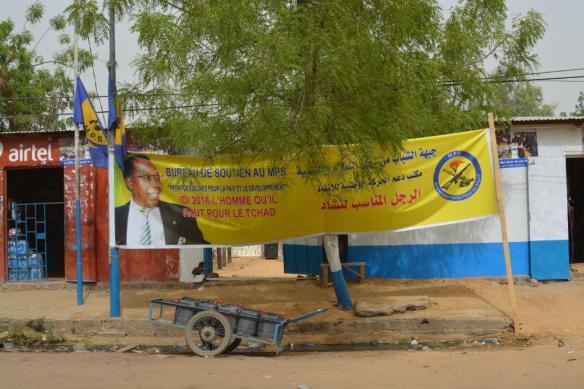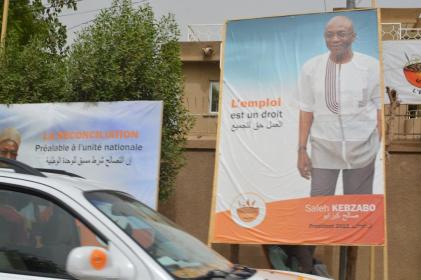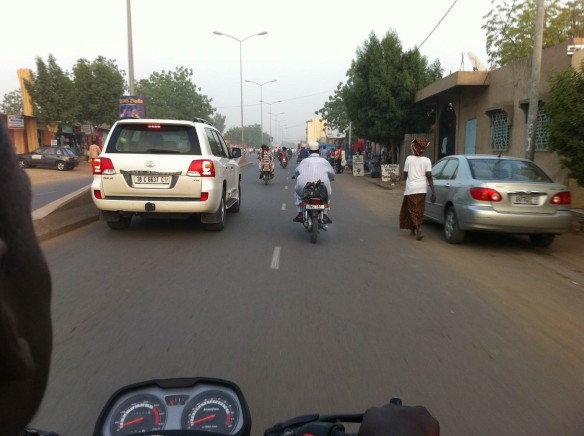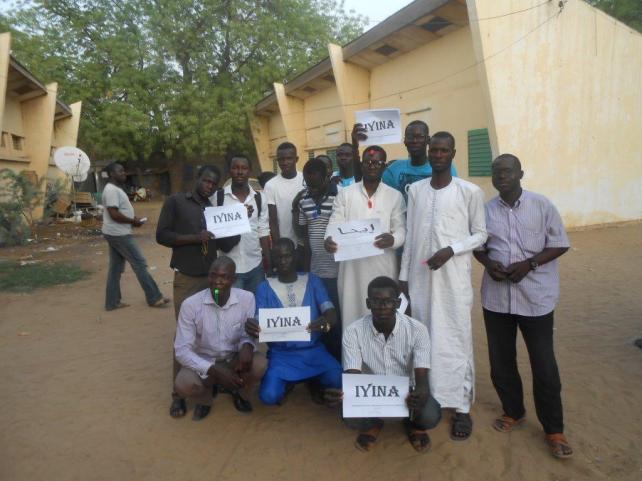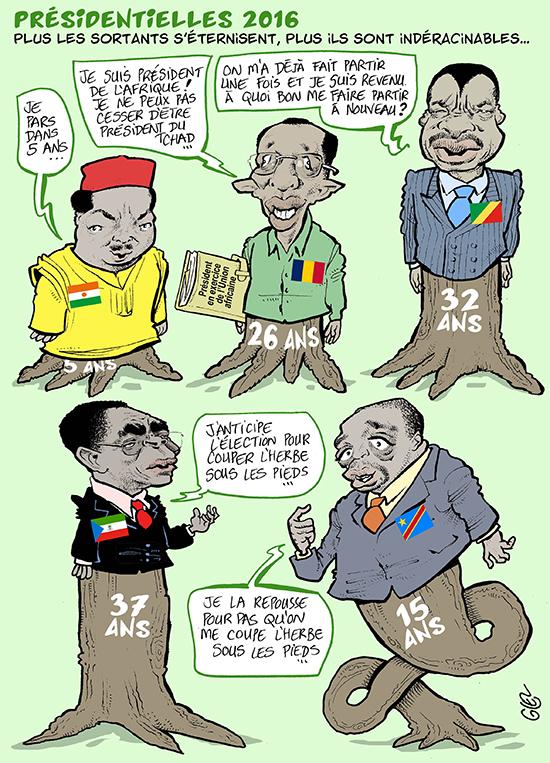
‘Les tirs de joie tuent les gens’ (Facebook Messenger)
10 April: day of the votes
No Facebook, no Whatsapp, no sms messages: this all leads to a weird silence. ‘What are they afraid of?’ asked Croquemort, Chadian protest slam artist, on Facebook. He is in Europe so he is able to post. The answer of other diaspora Chadians is that it is the fear for the people. We are wondering: what is happening in Chad today? Are we witnessing a real change in the political landscape? Is it possible that the sitting dictator/President will be sent away by the ballot box? Will he allow such a transition?
In this blog ‘report’ I summarize my experiences of the Presidential elections in Chad where, eventhough the official outcome has still to be finalised, it is clear that the current President Déby will remain in power, after having already served during a period of 26 years. This is bad news for the large group of people who voted against him. The first results circulating on Facebook and in bars and the outcomes as announced by the government on 21April are so divergent that the future of Chadian politics is very insecure. Read more about the elections in the blog of Deuh’b Emmanuel
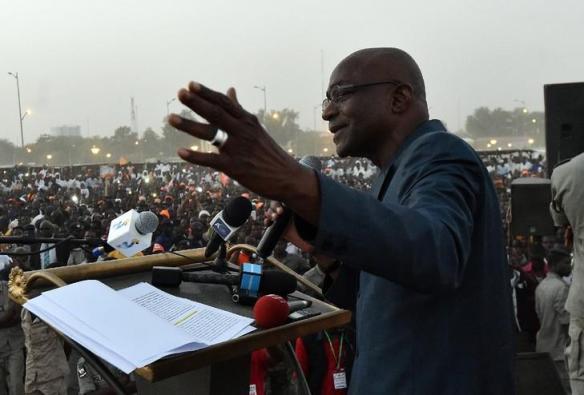
Kebzabo’s Facebook picture: in front of the masses…
The campaign
The campaign started on 20 March (see previous blog) and the closer the day of the elections the more posts on Facebook. The day before the elections numerous were the postings on Facebook supporting Saleh Kebzabo, the main opposition candidate to the President. At the ‘Place de la Nation’ Kebzabo assembled more people than the outgoing President Déby did a few days earlier. In Moundou, Kebzabo created a huge crowd in the streets. The pictures posted on Facebook also showed a huge amount of people supporting Kebzabo in Fianga. No doubt that this is real. And it seems indeed that Déby, who certainly wants to be in power for the coming years, did not expect such an overwhelming support for his rival Kebzabo (and by the way for a third candidate, Médard, the mayor of Moundou, economic capital of the south). It is expected that Déby will do everything to keep his power. But from what we have been observing, his power base is crumbling. Are people really fed up with him?
Diaspora
Skepticism about the influence of the diaspora and social media in the political process seems to have definitively settled with the events in Chad. It can simply not be denied how social media have been influencing the process and will influence the process in its ability to follow the elections and report about it. Citizen journalism at its best!
9 April was the day the military would vote. They voted and were expected to support the sitting President. One bureau in the North, where military voted, became the issue on Facebook. The voting was not done in a private environment, but everybody could follow who the soldiers would vote for. Eight soldiers who very openly refused to vote for Déby but supported Kebzabo, were arrested and put in prison. One of them was able to call his family and they (via contacts in the Netherlands) were able to connect to the most active diaspora Facebook-writer in Paris (‘fils de Maina’) who posted the story on Facebook. Nothing is hidden; the story is scandalous.
Voting: informal results
On 10 April more information about the voting was released by members of the diaspora, who obtain this information through calling with their informants in Chad; Despite the biometric cards, stories about fraud and many strange things that are happening during the elections circulate. Apparently the voices of the population can no longer be silenced. (blog Marielle Debos)
In one of his posts, fils de Maina analyses the elections and comes to a stunning conclusion: It could indeed happen that the votes are turned in such a way that Déby will win, but this time the population will not accept.
And then there were the weird moves of the French and the European Union – who urged the population to accept the results – and their demand to Kebzabo to accept the offer of the Déby to become Prime Minister: were they preparing the victory of Déby? The international community is following the elections eagerly as they do not wish Deby defeat, as that would probably mean an end to the Chadian interventions in the war on terror.
A friend confided in me during a Facebook Messenger exchange: ‘We are afraid of what will come’.
Sitting in my house in the Netherlands, Croquemort and I were convinced that there should be a second round, after all, Déby could not claim the first round, given the results that were published on Facebook.
21 April: announcements of (preliminary) results
Thursday night (21 April) MPS supporters’ rifles burst into N’Djamena’s air. After the winning results for their President, they were full of joy. Their bullets injured a lot of people and could be interpreted as a warning not to demonstrate. ‘Les tirs de joie tuent les gens’.The fraud election results, showing 61.5 % for President Déby and hence a prolongation of his term, will most probably lead to unrest in Chad. The future is very uncertain.
Of course everybody was expecting fraud, but the openness of it is stunning! After three empty announcements that the election results would be published, finally, on Thursday 21 April, Chadian television. broadcasted the press conference. The results were read first by the president of the CENI, (Commission Electorale Nationale Indépendante) and then by others. They went from the northern to the southern provinces. I was (in the Netherlands) with Croquemort, who was increasingly getting angry and was stupefied
by the announced results. Saleh Kebzabo, who was the 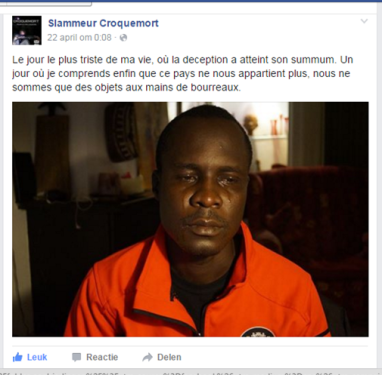 big winner in the pre-results which circulated on the internet, happened to be the big loser. In a few southern provinces he had around 50 %, but the huge victory was not given to him. Instead, Idriss Déby got most of the votes, losing only in a few provinces. In N’Djamena he had 50%, in the northern provinces over 80%, and a mere 24% in the south. We knew this would happen, but had hoped for results that would have allowed for a second round between Kebzabo and Déby, but alas… The regime of Déby has taken the situation in its hands.
big winner in the pre-results which circulated on the internet, happened to be the big loser. In a few southern provinces he had around 50 %, but the huge victory was not given to him. Instead, Idriss Déby got most of the votes, losing only in a few provinces. In N’Djamena he had 50%, in the northern provinces over 80%, and a mere 24% in the south. We knew this would happen, but had hoped for results that would have allowed for a second round between Kebzabo and Déby, but alas… The regime of Déby has taken the situation in its hands.
N’ Djamena and other cities are militarized, surveillance is everywhere.
The moment of waiting had come for the opposition to take the future in their hands. Will they indeed develop a shadow government? Or will they all turn to the party of Déby, like four of them already did? Everything can be bought. These four simply have chosen to become part of the system and have a good job, incorporated in the government.
RFI (Radio France International) reported neutrally. The French have asked Kebzabo to accept a post as Prime Minister. He has not accepted. Further silence from the side of the French. And the EU? The Americans?
Facebook, Whatsapp and SMS were all still blocked. No exchanges possible since 10 April, the day of the elections, except for those who know how to circumvent, how to hack.
29 April: Protest?
Facebook and all other connections are back. On 29 April the opposition announced the real results: Saleh Kebzabo and Laoukein Kourayo Mbaiherem Médard (the mayor of Moundou) are on top (resp. 31 and 24%), Déby is the fourth with 10 % of the votes. How these figures were composed is not clear, but they come closer to the informal outcome as was reported just after the elections.
Information is politics!
read as well the blog of Makaila and see this post of Maina with his as ever strong statements:
